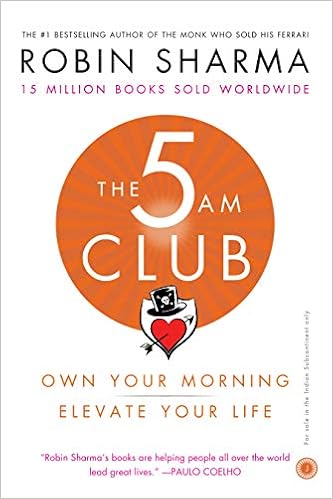
Never in my entire life, not even when I was a competitive figure skater and woke up early to practice on the ice BEFORE going to school, have I been a morning person. Just ask my mom how was the experience of making sure I was up and dressed for practice. Ask her how much conversation or joy there was in those early morning, before the light of day car rides to the ice rink. None. None is the answer.
In high school, my sister and I shared clothes, sports teams, and a wall but did not share evening or morning routines. She was an early morning riser. After a long day of school and sports practices, she often went to bed early in order to rise early and tackle her HW in the AM. I, however, would shower after sports practice and study until late into the night preferring to stay up to 2AM or later not wanting my head to hit the pillow until all the homework had been completed and the material I was studying firmly implanted into my brain. I was a night owl and I preferred it that way. Again, probably because of these perpetual late-night study sessions, mornings were NOT my thing. My sister drove us to school 100% of the time. I was in no morning condition to drive. Not ever. When she would make me go to school early so that she could meet with her calculus teacher before classes began for the day, I would simply catch some more zzz’s in the hallways while the school was empty and quiet. Mornings were for sleeping. Mornings were not for accomplishing anything.
In college, I am ashamed to admit it, but I sincerely paused before registering for an 8AM class. I had to have some strong convictions about that syllabus, a deep admiration for that professor, or the course was required for my graduation before I chose to enroll in an 8AM class.
After college, I took a job as an Americorps working for Habitat for Humanity as an on-site construction volunteer. Most days I had to be on the construction site by 7 or 8 AM and we lived about 35 minutes from the area where we worked. Needless to say, it was one year full of early mornings. Luckily, my roommate and coworker was just as much of a morning person as I was. That is to say, she was not either. We hardly spoke in the morning until we and the day had both warmed up. We quickly became great friends. She was a bridesmaid in my wedding 4 years later. Was that because we both hated early mornings? It definitely did not hurt.
After my year in Americorps wrapped, I took a job teaching high school Spanish. I don’t know if you’re aware, but when you teach school your day starts even earlier than when you attended school. Additionally, I lived about 40 minutes from my school and I was required by contract to be at school by 7:45AM. Years later when I had kids and was still working at the same school, I had to drop them off at their daycare by 7:00AM or I would be late getting myself to work. This means I would have to leave my house BEFORE 7AM!
Fast-forward to being a mom, and my firstborn, until about 6 months ago– and he’s 3.5, consistently woke up in the 5AM hour. I don’t even like to see the 6AM hour on my clock when I arise. My second born is a worse sleeper.
As you can easily see, I have never been able to escape early rising. I have a long pattern of fighting off the early mornings and always losing. So, I figured I’d take some advice from Maya Angelou to heart:

It’s time to consider changing my attitude towards mornings… and that’s likely to entail changing my habits, as well. Enter my New Year Intention for 2020 to “Be a Grateful Early Riser.” First, I change my perspective on rising early to gratitude. Then, I change my habits for early rising. Enter Robin Sharma’s book The 5AM Club: Own Your Morning, Elevate Your Life.
This book contends that all great “history-makers” were early risers with shared focuses, habits, and truths.
The 4 Focuses of History-Makers
- Capitalization IQ- “what makes a legendary performer so good isn’t the amount of natural talent they are born into but the extent of that potential they actualize– and capitalize.”
- Freedom from Distraction- “An addiction to distraction is the death of your production… Your escalation requires your isolation… The solitude, silence, and stillness of daybreak also triggers the production of neurotransmitters like dopamine and serotonin. Automatically and naturally, you enter ‘The Flow State’… In some ways, the new technologies and social media are not only eroding the Everests of our glorious productive potential, they are also training us to be less human. We have fewer real conversations, fewer true connections, and fewer meaningful interactions… And as we give our attention to numerous influences we leave bits of our focus on each activity we pursue.”
- Personal Mastery Practice- Maintaining the 4 Interior Empires: Mindset (psychology), Heartset (emotionality), Soulset (spirituality), Healthset (physicality).
- Day Stacking- “As you live each day, so you craft your life… we are all so focused on pursuing our futures that we generally ignore the exceedingly important value of a single day. And yet what we are doing today is creating our future.”
“Small, daily, seemingly insignificant improvements, when done consistently over time, yield staggering results”
“Enhancing anything in your day, ranging from your morning routine to a thought pattern to a business skills to a personal relationship, by only 1% delivers a 30%– yes, 30%– eleveation only a month after starting. Stay with the program and, in just one year, the pursuit you’ve been focusing on has elevated 365%, at least. The main point I’m making here is concentrate monomaniacally on creating great days– and they’ll stack into a gorgeous life.”
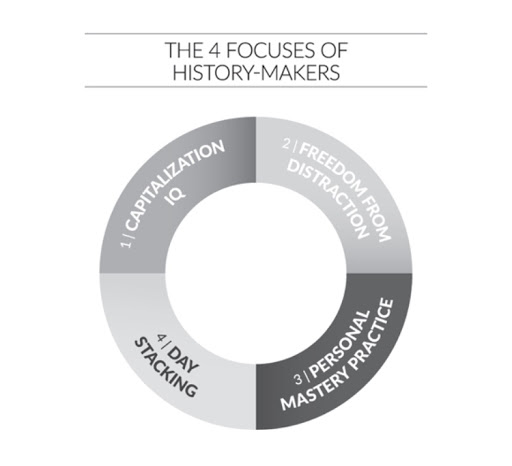

The 5 Truths Behind Excellent Habits:
- Truth #1: World-class willpower isn’t an inborn strength, but a skill developed through relentless practice. Getting up at dawn is perfect self-control training.
- Truth #2: Personal discipline is a muscle. The more you stretch it, the stronger it grows. Therefore, the samurais of self-regulation actively create conditions of hardship to build their natural power.
- Truth #3: Like other muscles, willpower weakens when tired. Recovery is, therefore, absolutely necessary for the expression of mastery. And to manage decision fatigue
- Truth #4: Installing any great habit successfully follows a distinct four-part pattern for the automation routine. Follow it explicitly for lasting results.
- Truth #5: Increasing self-control in one area of your life elevates self-control in all areas of your life. This is why joining the 5AM Club is the game-changing habit that will lift everything else that you do.
The 3 Values of Heroic Habit-Makers
- Value #1: Victory demands consistency and persistency.
- Value #2: Following through on what is started determines the size of the personal respect that will be generated.
- Value #3: The way you practice in private is precisely the way you’ll perform once you’re in public.
The 1 General Theory of Self-Discipline Spartans: To regularly do that which is hard but important when it feels most uncomfortable is how warriors are born.
“For most people ready to get up before daybreak, each day of this first phase is a hardship. They feel like giving up. They complain that rising early just isn’t for them. That they are not built for this routine and that it’s just not worth the pain.
My advice is simple: Continue at all costs. Persistency sits at the threshold of mastery.
Please also remember this rule: when faced with a choice, always chose the one that pushes you the most, increases yoru growth and promotes the unfoldment of your gifts, talents, and personal prowess. So, when you feel like quitting, perserve.
#1. To make a habit last, never install it alone.
#2. The teacher learns the most.
#3. When you most feel like quitting is the time you must continue advancing.”
So, then, how DO YOU install a habit?
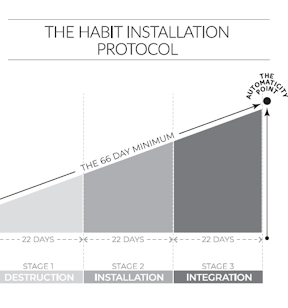
And if/when I install the habit of waking up at 5AM every day, what should I do with the first hour while I’m in “The Flow State” away from distraction in order to stack together the best days into the best life? The answer is simple, “The 20/20/20 Formula”, of course!
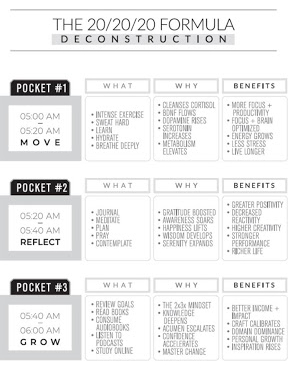
“Journaling” has always felt kind of nebulous to me. As a kid I kept journals but I mostly just detailed what was going on in my life and my heart. The 5AM Club suggests this framework for developing a rewarding journaling habit:
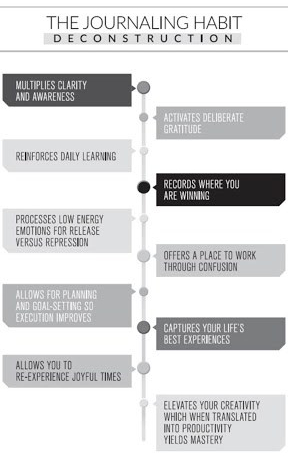
Obviously, I’ll never succeed at flexing these 5AM muscles if I don’t also get enough rest. I know myself and I know that one of the reasons I despise mornings is because I love to sleep and that I require 7-8+ hours in order to feel rested and ready to tackle the day. So, here is the 5AM suggestion for an optimal evening routine to balance out the 5AM wake up for the 20/20/20 routine:
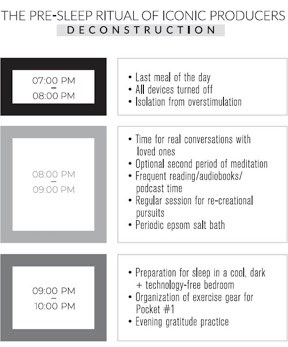
Given all of these frameworks, motivating ideas, and specific suggestions, the essential question is this:
Can a 35 year morning hater reform her ways?
The jury is still out!
Currently, waking up at 5AM is something my kids still make me do and let me tell you there is no solitude, silence, or stillness in those 5AM wake-ups. I am learning to fill those 5AM wake-ups with joy and gratitude– despite my decades of rejecting the 5AM hour.
However, once they are consistently sleeping until 6AM (or later, fingers crossed), I think an Upholder like me has a fighting chance to become a member in good standing in the 5AM Club.
Stay tuned!

